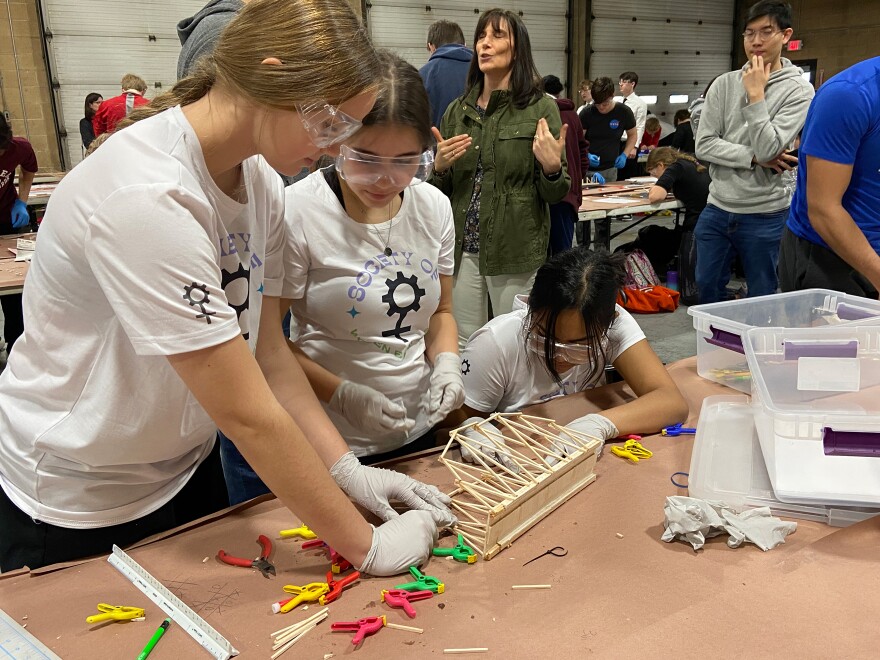Women’s participation in the American workforce has increased from a 30% share in the 1950s, to nearly half of workers today. But, there are still some trades where women are underrepresented.
The U.S. Bureau of Labor Statistics reports women are underrepresented in manufacturing, agriculture, transportation and utility work, fields where they makeup less than 30% of the total workforce.
But construction is by far the most male-dominated industry – just 11% of the industry is made up of women.
Through concentrated efforts, a third-generation construction company in Columbus has been able to raise that figure for their operation. Marker Construction’s workforce is 18% women and became woman owned when Alison Marker took over for her father as president and CEO, and bought ownership in the company last year.
Marker wasn’t the natural successor to the family business.
“There was no representation of women that I was aware of in the construction industry," she said. “I studied psychology and Women's Studies, and got my master's in social work. And then I became a psychotherapist.”
While the two industries aren’t traditionally aligned, when Marker’s father asked her to help out, she did. And, her role in the company grew into what it is today.
But, Marker didn’t forget her earlier schooling and became determined to do things a bit differently from other construction companies. Early on, she set out to ensure the women in the company were being paid on par with men.
Labor statistics highlighted by the National Association of Women in Construction show that while women in the U.S. still make just 83% of what men make, women in construction occupations come closer to closing that gap – they’re paid about 96% of what men in the industry are paid.
Marker said vigilant companies like hers are working to eliminate that gap completely, and construction jobs in general pay better than a lot of jobs out there.
“Construction pays very well. I remember when I got out of school with a master's degree in social work, and I was making $11.72 an hour with a master's degree. You can come work in a construction company right now, have no degree and make so much more than that," Marker said.
Related: It's Equal Pay Day. The gender pay gap has hardly budged in 20 years. What gives?
One of the reasons civil engineer Abbey Zimmer was attracted to working with the Ohio Department of Transportation was the standardized pay grades in the government work.
“I was specifically really interested in working for ODOT because I knew there wouldn't be a gender pay gap that regardless of, of, you know, if I was a woman or a man doing the same job and I'll be paid the same amount of money so that was kind of one of my, my sticking points," Zimmer said.
Zimmer said industries improve with diversity.
“I think every person in general has a unique perspective when they come onto a job site. So more and more diversity in any field is better because you have more ideas and more innovation comes out of it,” she said.
Marker said more women will enter the field when employers work to meet their needs. She said her company makes flexibility the norm, provides training to help employees grow into more advanced roles, utilizes mentorships and internships and encourages innovative job descriptions that can change to suit skills.
“We do a lot of different things. I guess from kind of from the big picture, I'm always looking through a lens of feminism, honestly, just my background with women's studies, I'm always looking through that lens," Marker said.
They send women employees to give presentations on the industry.
“We're going to elementary schools and middle schools, high schools, tech, schools, trade, schools, universities," Marker said.
Often, the goal isn’t direct recruitment, but planting the seeds that will help girls envision themselves in the industry, to shed the idea that engineering, project planning and other construction work is reserved for men.
Zimmer reaches out to young people through ODOT’s miniature bridge building competition for high school students in Franklin County.

“I think STEM outreach is absolutely the most important thing that we can do for getting women and just in general, students interested in engineering," Zimmer said.
Zimmer, Marker and five women that work at Marker told stories of what led them to the field that included people like teachers and parents, outreach efforts and programs that inspired and supported them along the way.
“We definitely don't see a lot of women out in the field right now. But the ones who are we have a really close relationship, Zimmer said.
Still, it is sometimes hard to navigate mostly male spaces.

Kara Keller is a project engineer at Marker.
“Society is still very heavy on that it's a man's job with construction and so not everybody is focusing more on the diversity yet and they're just still in like go mode just construction and you I was the only woman in the field there. And so that was really hard," Keller said.
Keller said Marker’s environment is giving them the tools and the space to forge their own career path in ways other employers haven’t.
And, there are more resources than ever for women in the construction and engineering fields through professional associations, educational programs, other women and forward-thinking employers.
Zimmer said there is plenty of opportunity for a woman who wants to explore the field.
“If you're interested, don't let anything stop you.”



